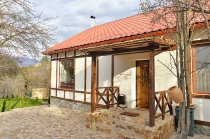
Marriott Tsaghkadzor
The hotel complex "Marriott Tsaghkadzor" offers a comfortable stay in the fresh air of Tsaghkadzor,...
Golden Palace Resort
"Golden Palace Resort-Spa" is the only officially recognized 5-star hotel in Tsakhkadzor, in...
Elegant
Elegant" hotel has stylish rooms where the guests can enjoy picturesque view of mountains and...
Villa Jrhogher
"Villa Jrhogher" is situated in the heart of Dilijan’s forests and is a perfect choice for a small group of friends, colleagues or family members to host up to 10 guests. Free private parking...Greece
.jpg&width=&height=)
| Capital | Athens |
| Area | 131 957 km² |
| Population | 11 million people |
| Official language | Greek |
| Currency | euro |
| Climate | summer +35°C winter +10°C |
| Recommended type of holiday | sightseeing beach vacation |
About country
A flavourful melting pot of sparkling night spots, fresh seafood, sizzling Mediterranean passion and mythical legend, Greece is a fascinating and enchanting destination - whether lounging on a sandy stretch, or exploring ancient relics.
Greece's urban hubs are home to some of the world's most glorious and prized ancient and medieval architecture - such as Athens' white marble Parthenon and Thessaloniki’s proud Byzantine churches - and the setting of some of humankind's oldest tales. On the coast, find bustling, umbrella-peppered beaches and secluded sandy coves, washed by turquoise waters and regularly doused in sunshine.
Off shore, Greece's 1400 islands, such as party-hard Mykonos and picturesque Santorini, offer a rainbow of paradisiacal settings for an idyllic island-hopping adventure. Find true Mediterranean peace on Kefalonia and Amorgos, ideal hiking terrain on the peaks and troughs of Crete, and prime scuba diving and sea kayaking conditions around pretty much every coastal corner.



Sightseeing
Fortified by the Venetians, this charming medieval sea port is protected by two castles – the hilltop Old Citadel and the seaward New Fortress. The UNESCO-listed old town is packed with 19th-century neo-classical mansions, many housing quaint tavernas and souvenir shops at ground level. The Spianada, a vast green space designed by the French, with a music pavilion and a cricket field, is overlooked by the arcaded Liston, home to several elegant cafes.
On the edge of a flat plain in Thessaly, Central Greece, the Meteora is Greece’s second most important group of monasteries after Mount Athos. From the 11th century onwards, when the first hermits settled here, 24 Orthodox monasteries were built atop bizarre rocky pinnacles overlooking the plain. Today, six monasteries, several decorated with late-Byzantine frescoes, are open to the public.
Rhodes’ medieval old town is a UNESCO world heritage site - explore the car-free cobbled back alleys after dark for a truly unforgettable medieval experience. The Order of St John of Jerusalem occupied the city from 1309 to 1522, and bequeathed it with the 4km-long city walls, the Palace of the Grand Masters and the Street of the Knights. It subsequently fell to the Ottoman Turks – their traces include Islamic architecture such as the Mosque of Soliman and the Great Hamam.
Begin with the UNESCO-listed Acropolis rock, home to the magnificent fifth-century BC Parthenon, then stroll down to the Ancient Agora, once Athens' civic, political and commercial centre. Be sure to check out the ultra-modern New Acropolis Museum, displaying ancient finds from the Acropolis site, and opened in summer 2010. Don't miss the world-class National Archaeological Museum, packed with ancient marble statues, jewellery and ceramics.



Traditions
Customs and traditions in Greece and the Greek Islands are either of a religious character or coming from paganism. Furthermore, most of the traditions and festivals still celebrated today are religious.
The Greeks are very superstitious people and believe a lot in religion but also in supernatural or paranormal phenomenon.
Traditions and superstitions vary from island to island, from villages to villages and from region to region.
Here are some of the many Greek traditions still honoured by all of the Greeks, no matter their age, until today.



Cuisine
Eating out is national pastime in Greece. For an informal snack, try an ouzeri, where you can join locals for small platters of savoury appetisers and a glass or two of aniseed-flavoured ouzo. Visit a mezedopolio to feast on a selection of tasty mezes (similar to Spanish tapas) which you might accompany with a flask of rakija (a potent spirit made from distilled grapes) or a carafe of hima (barrel wine).
For a more hearty meal, try a taverna, serving generous portions of traditional Greek favourites, often in a rustic (or pseudo-rustic) setting – the best ones have open log fires and stage occasionally live music. A psarotaverna is a taverna that specialises in fish and seafood. Last but not least, an estiatorio is a full blown restaurant, where service will be a little more formal and the menu will probably include a choice of both Greek and international cuisine, as well as quality bottled wines.
Greek food tends to be very simple, rarely involving sauces but with full use of local seasonal produce, olive oil and charcoal grills – just as people have been eating in outlying villages for many centuries. However, Athens and some of the more fashionable islands such as Santorini and Mykonos have seen the arrival of fusion cuisine and so-called modern taverna fare (involving lighter dishes with more subtle flavours and artistic presentation).





